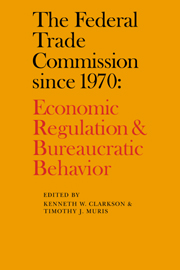Book contents
- Frontmatter
- Contents
- List of contributors
- Preface
- 1 Introduction
- Part I The institutional setting
- Part II Nature and consequence of FTC actions
- Introduction
- 6 Bureau of Competition: antitrust enforcement activities
- 7 Information for antitrust and business activity: line-of-business reporting
- 8 Industry structure investigations: Xerox's multiple patents and competition
- 9 Exclusionary practices: shopping center restrictive covenants
- 10 Legislative powers: FTC rule making
- 11 Rewriting consumer contracts: creditors' remedies
- 12 Regulating postpurchase relations: mobile homes
- 13 Regulating information: advertising overview
- 14 Special statutes: the structure and operation of the Magnuson-Moss Warranty Act
- Part III Conclusions and reforms
- Notes
- Selected bibliography
- Index
Introduction
Published online by Cambridge University Press: 05 November 2011
- Frontmatter
- Contents
- List of contributors
- Preface
- 1 Introduction
- Part I The institutional setting
- Part II Nature and consequence of FTC actions
- Introduction
- 6 Bureau of Competition: antitrust enforcement activities
- 7 Information for antitrust and business activity: line-of-business reporting
- 8 Industry structure investigations: Xerox's multiple patents and competition
- 9 Exclusionary practices: shopping center restrictive covenants
- 10 Legislative powers: FTC rule making
- 11 Rewriting consumer contracts: creditors' remedies
- 12 Regulating postpurchase relations: mobile homes
- 13 Regulating information: advertising overview
- 14 Special statutes: the structure and operation of the Magnuson-Moss Warranty Act
- Part III Conclusions and reforms
- Notes
- Selected bibliography
- Index
Summary
In this part, several scholars analyze major FTC cases and rules, considering their impact upon consumers. To evaluate whether the Commission has improved since 1969, this is the crucial issue. At that time, the Commission was condemned for ignoring or even harming consumers; the Commission's improved reputation stems from its perceived role as a staunch consumer protector. Thus, this reputation stands or falls based upon the real impact of FTC actions upon consumers. To determine that impact, the authors employ economic analysis. Economic analysis is necessary to assess FTC performance even when the Commission's goal is not to help all consumers. For example, if the FTC is attempting to help the poor at the expense of other consumers or to help businesses at the expense of consumers, economic analysis can determine whether the Commission has accomplished its goal.
We divide our inquiry along the two major substantive bureaus of the agency, competition and consumer protection, and use activities selected on the basis of two criteria. First, we cover the major components of the work of the two bureaus, making our analysis comprehensive. Second, some matters are important in themselves, not merely because they represent a class of FTC actions. To choose these matters, we relied both on our evaluation of what was major and on Commission statements made in response to congressional inquiries in 1976 and 1978.
- Type
- Chapter
- Information
- The Federal Trade Commission since 1970Economic Regulation and Bureaucratic Behavior, pp. 61 - 64Publisher: Cambridge University PressPrint publication year: 1981



